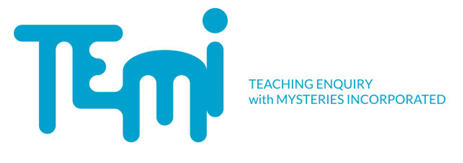Supporting actions on Innovation in the classroom: teacher training on enquiry based teaching methods on a large scale in Europe (Grant agreement ID: 321403)
Partners
Università degli Studi di Milano, (Marina Carpineti and Marco Giliberti), Universitaet Bremen (Ingo Eilks), University of Limerick, (Peter Childs, Sarah Hayes), Sheffield Hallam University, (Julie Jordan and Tony Sherborne), Hogskolen i Sorost Norge (Jorn Nyberg), Universitaet Wien (Anja Lembens), Weizmann Institute of Science, (Rachel Mamlok-Naaman), Universiteit Leiden (Pedro Russo), Univerzita Karlova V Praze (HanaCtrnactova), Sterrenlab (Cristina Olivotto), TRACES (Matteo Merzagora), Cnotinfor (Secundino Correia)

TEMI was an FP7 Science and Society project which worked with schools across Europe to develop and implement innovative education and training programmes to help transform science and mathematics teaching practices across Europe, by giving teachers new skills to engage with their pupils, exciting new resources and the extended support needed to effectively introduce enquiry-based learning into their classrooms. This project was part of a response from the European Commission to tackle “the alarming decline in young people’s interest for key science studies and mathematics” (European Commission 2007), with a focus on inquiry-based science education (IBSE).
This was done by working with teacher training institutions and teacher networks across Europe where we implemented innovative training programmes called ‘enquiry labs’. The enquiry labs used scientists and communication professionals (e.g. actors, communication experts, etc.) to mentor teachers through the transition to use enquiry to teach science.
The project equipped teachers with new resources and methods to teach STEM subjects (science, technology, engineering and mathematics) using mystery as the starting point. The idea is to use mysteries or discrepant events to arouse student interest, motivate students to inquire and find out scientific explanations, and develop science enquiry skills. Such events stimulate an observer’s natural curiosity and will motivate the observer to learn more about the topic. Mysteries or discrepant events engage the observer in the learning process and are rooted in inquiry-based learning.
Summary of the impact and outputs
- TEMI delivered 183 training courses, 1371 hours, across the TEMI partners in 11 countries, training 958 teachers,
- Teaching the TEMI way: how using mysteries support science learning a booklet describing in an easy format the TEMI methodology and the TEMI Book of Science Mysteries which provides 30 lessons plans deploying the methodology, (see full output here).TEMI produced Light Mystery: script with added comments, a resource for schools and theatre companies. The play explores the world of physics to trigger wonder and curiosity. The play was performed in Italy by the University of Milan partner team and used in the TEMI training with discussion on how to use scientific theatre to engage with young people.
- Communicated results at 97 public events and 68 conferences on teaching and education
- 20 articles published in academic journals. Listed in 5 international repositories, 25 articles in practitioner and general press.
- TEMI app. for android and iTunes.
- 60 teachers convened at the European Space Agency Summer Teachers Programme in the Netherlands and discussed how to explain the concept of gravity to post-primary pupils by using the enquiry-based approach and the TEMI methodology .
- 11 Pre-Service science teachers (PSSTs) were involved in three rounds of development from 2013-2016, supported by the SSPC-UL team. The PSSTs developed TEMI classroom materials for the project as part of their Final Year Research Projects (FYRP). The SSPC-UL TEMI team now have a bank of over 30 developed, trialled and evaluated TEMI lessons, via participatory action research approaches.
- The SSPC-UL team disseminated the TEMI methodology nationally with 233 teachers via the Irish Science Teachers Association (ISTA) in-service workshops and for PSSTs in UL prior to their final year school placement. An online Community of Practice was developed to support the sustainability of the project.Supporting actions on TEMI online @: Supporting actions on Innovation in the classroom: teacher training on inquiry based teaching methods on a large scale in Europe (europa.eu)
















